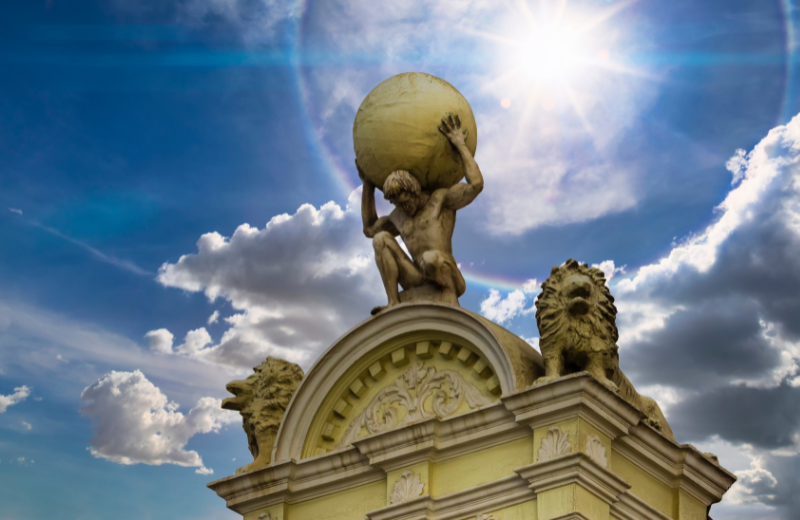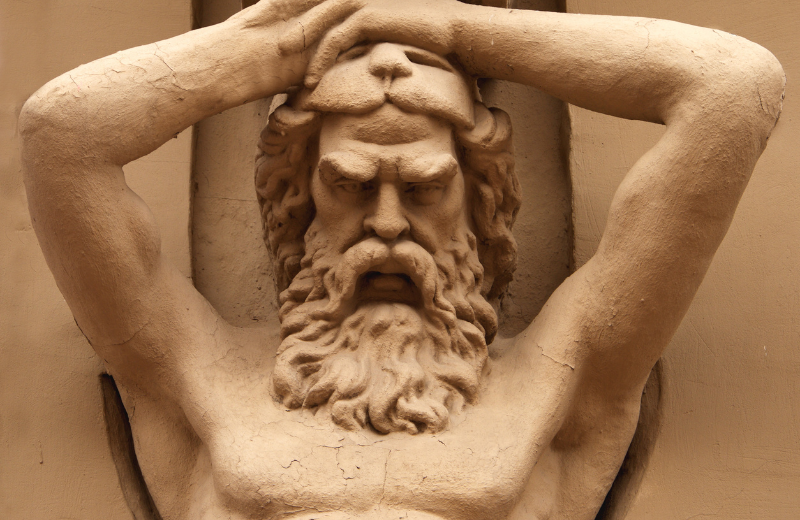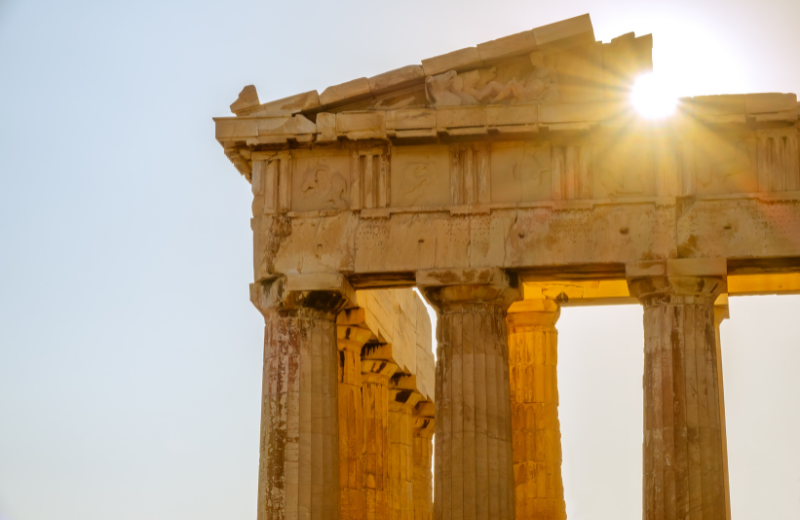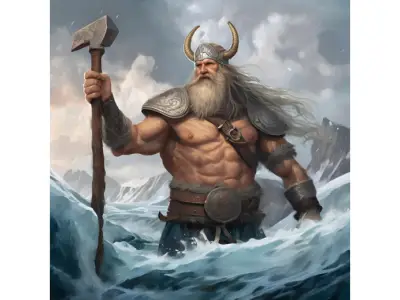Greek mythology is full of fascinating characters, each with their own stories, powers, and symbolism. One of the most intriguing figures is Atlas, a Titan known for his strength and enduring punishment. Whether you're new to Greek mythology or a seasoned enthusiast, understanding Atlas can offer insight into ancient beliefs and the human condition. This blog post explores who Atlas is, what he represents, and how his story has shaped cultural references for centuries.
Jump to:
Recommended for you!
Best SellersWho is Atlas in Greek Mythology?
Atlas is one of the Titans, a race of powerful deities who ruled during the Golden Age of Greek mythology. The Titans were the children of Uranus (Sky) and Gaia (Earth), and Atlas was among their most formidable members. His name is often associated with strength and endurance, but there's more to Atlas than just his ability to bear heavy burdens.
Atlas played a role in the Titanomachy, the great war between the Titans and the Olympian gods led by Zeus. After the Titans were defeated, Atlas received one of the harshest punishments: he was condemned to hold up the sky for eternity. This image of Atlas with the sky or the world on his shoulders has become a powerful symbol in both ancient and modern times.
What is Atlas the God of?
Atlas is often confused with being the god of endurance or strength, given his role in holding up the sky. However, his true "domain" is more about bearing the weight of the heavens as a punishment rather than ruling over a specific element of the natural world.
The Myths and Legends of Atlas

The myths surrounding Atlas are some of the most captivating in Greek mythology, showcasing his strength, cunning, and the consequences of his choices. These stories highlight the trials he endured and reveal his interactions with some of the most famous heroes in ancient lore.
The Titanomachy and Atlas’s Punishment
The story of Atlas begins with the Titanomachy, a ten-year war between the Titans and the Olympians. Atlas fought on the side of the Titans, opposing the Olympian gods who sought to overthrow them. When the Titans were defeated, Zeus, the king of the Olympian gods, punished Atlas by forcing him to hold up the sky for all eternity. This was intended as a reminder of the power of the Olympian gods and the severe consequence of opposing them.
Atlas and Hercules
One of the most famous myths involving Atlas is his encounter with Hercules. As part of his Twelve Labours, Hercules was tasked with retrieving the golden apples from the Garden of the Hesperides, which was guarded by Atlas's daughters. Hercules, knowing that Atlas was the only one who could retrieve the apples, offered to take Atlas's burden temporarily while Atlas fetched the apples. Atlas agreed, but upon returning, he tried to trick Hercules into carrying the sky forever. However, Hercules cleverly asked Atlas to hold the sky again "just for a moment" so he could adjust his cloak—and then promptly left, leaving Atlas with his original burden.
Atlas and Perseus
Another myth involving Atlas is his encounter with Perseus. After slaying the Gorgon Medusa, Perseus encountered Atlas. According to some versions of the myth, Atlas refused to offer hospitality to Perseus, and in retaliation, Perseus used Medusa's severed head to turn Atlas into stone. This transformation is said to have created the Atlas Mountains in North Africa, symbolising the Titan's eternal punishment.
The Symbols of Atlas
Atlas is most famously represented by the image of a man holding up a massive globe, which is often depicted as the Earth or the heavens. This symbol has become so ingrained in Western culture that it’s often used to represent strength, endurance, and the weight of responsibility.
The Globe on His Shoulders
The globe that Atlas carries is sometimes interpreted as the Earth, but in Greek mythology, it was actually the sky. The confusion likely stems from artistic representations that evolved over time. In any case, the image of Atlas carrying a great weight on his shoulders has become synonymous with the idea of someone bearing a heavy burden or responsibility.
The Pillars of Atlas
In some myths, Atlas is associated with the Pillars of Hercules, which are said to hold up the sky at the edge of the world. These pillars were believed to be located near the Strait of Gibraltar, marking the boundary of the known world in ancient times. Atlas's association with these pillars further emphasises his role as a supporter of the heavens.
What Powers Does Atlas Have?

As a powerful Titan, Atlas possessed several extraordinary abilities that made him one of the most formidable figures in Greek mythology. His powers were symbolic, representing various aspects of strength and resilience. Here are some of the key powers attributed to Atlas:
- Immense Strength: Atlas was known for his incredible physical strength, far surpassing that of humans and even many gods. This strength was necessary to carry out his eternal punishment of holding up the sky, a feat no ordinary being could endure.
- Endurance: Perhaps his most defining power, Atlas's endurance allowed him to sustain the immense burden of the heavens on his shoulders for eternity. This endurance is symbolic of unyielding resilience, even in the face of an overwhelming and endless task.
- Immortality: Like all Titans, Atlas was immortal. This meant he could not die or be easily defeated, making his punishment of holding up the sky all the more torturous, as it was a sentence without end.
- Elemental Connection: As a Titan closely associated with the earth and sky, Atlas was believed to have a deep connection to the natural elements. This connection gave him an intrinsic understanding and influence over the forces of nature, particularly the celestial and terrestrial realms.
- Strategic Intelligence: While primarily known for his physical attributes, Atlas also demonstrated strategic intelligence. This is evident in myths like his encounter with Hercules, where he initially tries to outsmart the hero, showcasing his cunning nature.
- Unbreakable Willpower: Atlas’s willpower is unmatched, as he continues to bear his burden without faltering. This power is also mental, symbolising the inner strength needed to endure perpetual hardship.
Atlas's Relationships, Children, and Family Tree
Atlas’s relationships and family connections are integral to his story, linking him to some of the most important figures in Greek mythology. His lineage and offspring highlight his influence and the continuation of his legacy through his descendants.
- Parentage: Atlas was the son of the Titan Iapetus and the Oceanid Clymene, making him part of a significant and powerful family in Greek mythology.
- Brothers: His siblings included Prometheus, the Titan who gave fire to humanity, symbolising foresight and intelligence, and Epimetheus, known for his lack of foresight and his role in the creation of mankind and the myth of Pandora.
- Daughters (Hesperides): Atlas is perhaps most famous for his daughters, the Hesperides, who were nymphs of the evening and guardians of the golden apples. These apples were believed to grant immortality and were a central element in the myth of Hercules and his Twelve Labours.
- Daughters (Pleiades): Atlas is also said to be the father of the Pleiades, a group of seven sisters who were transformed into a constellation. The Pleiades are associated with various gods and heroes, and their transformation into stars is often seen as a symbol of their escape from the hardships of mortal life.
Atlas's Worship and Legacy

Atlas’s legacy as a Titan and symbol of endurance has persisted through the ages. Although he wasn't worshipped in the same way as the Olympian gods, his influence is evident in both ancient and modern representations of strength and responsibility.
Temples and Sanctuaries Honouring Atlas
Unlike the grand temples dedicated to the Olympian gods, there were no major temples solely devoted to Atlas. However, his image and symbolism were often recognised in various places, particularly those associated with endurance and strength, such as sites at the edge of the known world, where he was believed to hold up the sky.
Statues and Depictions of Atlas
In ancient art, Atlas is frequently depicted carrying the globe or the heavens on his shoulders. These statues and images serve as powerful symbols of his enduring strength and the weight of his eternal punishment, making Atlas an iconic figure in both Greek culture and broader Western symbolism.
Modern Interpretations and Legacy
Atlas’s legacy continues to influence modern culture, particularly in the way he is symbolically used to represent the burden of carrying heavy responsibilities. His image is commonly used in literature, art, and even corporate logos to convey strength and endurance. The concept of "carrying the world on one's shoulders" remains a powerful metaphor for bearing significant burdens or responsibilities in today’s world.
Recommended for you!
Best SellersFrequently Asked Questions About Atlas
Did Atlas hold up the Earth or the Sky?
In Greek mythology, Atlas was originally tasked with holding up the sky, not the Earth. The common image of Atlas carrying the Earth is a later artistic interpretation, likely stemming from the broader symbolic association of Atlas bearing the weight of the world on his shoulders.
What Happened to Atlas at the End of the Myth?
Atlas's fate is sealed as an eternal punishment, where he remains condemned to hold up the sky indefinitely. Unlike many myths where characters find resolution or redemption, Atlas's story is one of perpetual endurance without a definitive end.
Is Atlas in the Underworld?
Atlas does not reside in the Underworld. His punishment requires him to remain at the edge of the world, supporting the sky. However, his myth does connect with the Underworld through the story of Perseus, who uses Medusa's head to turn Atlas into stone.
How is Atlas Related to Zeus?
Atlas and Zeus are not directly related as brothers, but both are descendants of the primordial deities. Atlas is a Titan, while Zeus is one of the Olympian gods who overthrew the Titans during the Titanomachy. Atlas's punishment was decreed by Zeus following this conflict.
Who is Stronger, Atlas or Cronos?
Cronos, the father of Zeus and leader of the Titans, is often considered more powerful in terms of overall influence and status. However, Atlas is known for his unparalleled strength and endurance, which were essential for bearing the weight of the sky. Comparatively, their strengths are different in nature, with Cronos wielding power over time and rulership, and Atlas embodying physical and mental endurance.
Why Did Zeus Punish Atlas?
Zeus punished Atlas for his role in the Titanomachy, the great war between the Titans and the Olympians. As a prominent figure who fought against Zeus, Atlas was singled out for a particularly harsh punishment—holding up the sky for eternity—as a symbol of the consequences of opposing the Olympian gods.
Did Atlas Have a Wife?
Atlas is sometimes said to have had a wife, Pleione, who was the mother of the Pleiades. However, myths about his marital status vary, and some versions of the myth do not mention a wife at all, focusing instead on his role as a father to the Hesperides and the Pleiades.
Why Did Atlas Turn His Daughters into Stars?
Atlas did not turn his daughters into stars; rather, the transformation of the Pleiades into a constellation was the work of Zeus, who placed them in the sky to protect them from the pursuit of the giant Orion. This act of transformation is seen as both a form of escape and immortalisation, linking Atlas’s legacy to the stars.
Study Greek Mythology for £29
If you’re fascinated by Atlas and the stories within Greek mythology, why not deepen your knowledge with our Greek Mythology Diploma Course at Centre of Excellence? This fascinating course covers the myths, gods, heroes, and symbols of ancient Greece, and for a limited time, you can enrol for just £29!













